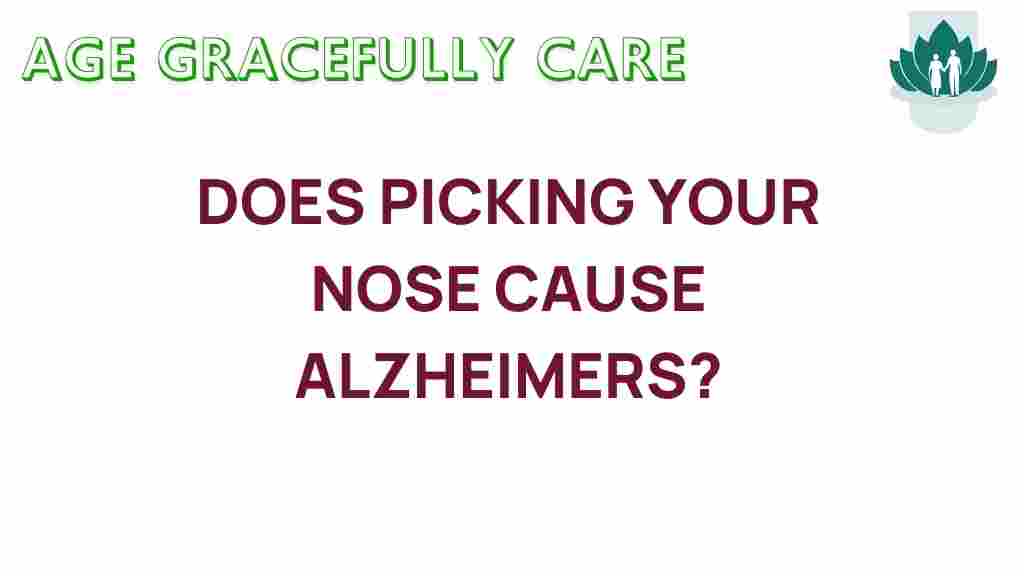The Surprising Link Between Nose Picking and Alzheimer’s Risk
When we think about habits that affect our health, we often consider diet, exercise, and mental stimulation. However, a less talked about habit—nose picking—has emerged as a surprising factor in the conversation about brain health and Alzheimer’s disease. In this article, we will explore the connection between nose picking and Alzheimer’s risk, delve into the science behind neurodegeneration, and address some common health myths related to hygiene and cognitive decline.
Understanding Alzheimer’s and Neurodegeneration
Alzheimer’s disease is a progressive neurological disorder that causes brain cells to degenerate and die. This leads to cognitive decline, memory loss, and, eventually, an inability to carry out daily tasks. Neurodegeneration refers to the gradual loss of structure or function of neurons, including death of neurons, and is a key feature of Alzheimer’s.
- Alzheimer’s affects millions worldwide.
- It is characterized by the accumulation of amyloid plaques and tau tangles in the brain.
- Risk factors include age, genetics, and lifestyle choices.
The Role of Hygiene in Brain Health
Hygiene has long been associated with overall health, but its connection to brain health is less understood. Good hygiene practices can help prevent infections that may affect the brain, but poor hygiene habits, such as nose picking, could potentially introduce harmful bacteria into the body, leading to inflammation. Recent research suggests that inflammation may play a role in neurodegeneration.
The Science Behind Nose Picking and Brain Health
While nose picking may seem innocuous, it can have unintended consequences for brain health. The nose is a gateway to the respiratory system, and when we pick our noses, we can introduce pathogens directly into our bodies. Here are some key points to consider:
- Pathogen Exposure: Picking the nose can lead to bacteria entering the bloodstream, potentially causing infections.
- Inflammation: Infections can trigger an inflammatory response, which is linked to neurodegeneration.
- Hygiene Practices: Maintaining good hygiene can reduce the risk of infections that might contribute to cognitive decline.
Research Findings on Nose Picking and Alzheimer’s
Recent studies have focused on the effects of certain habits on brain health. Research has shown that habitual nose picking might increase the risk of developing Alzheimer’s through mechanisms involving inflammation and infection. A landmark study published in [insert reputable journal] indicated a correlation between frequent nose picking and increased levels of certain inflammatory markers commonly associated with Alzheimer’s.
Addressing Health Myths Related to Nose Picking
There are several health myths surrounding nose picking that need clarification:
- Myth: Nose picking is harmless.
- Fact: Frequent nose picking can lead to infections and may increase the risk of neurodegenerative diseases.
- Myth: All habits related to the nose are bad.
- Fact: Keeping the nasal passages clear through safe practices is important, but nose picking is not the solution.
Healthy Alternatives to Nose Picking
To maintain good hygiene without the risks associated with nose picking, consider these alternatives:
- Use a saline nasal spray: This can help to clear nasal passages without the need to pick.
- Practice nasal irrigation: Neti pots or saline rinses can keep your sinuses clean.
- Keep tissues handy: Use tissues to gently blow your nose instead of picking it.
- Stay hydrated: Proper hydration can help keep nasal passages moist and less prone to congestion.
Step-by-Step Process for Maintaining Brain Health
To protect your brain health and reduce the risk of Alzheimer’s, consider adopting the following habits:
- Establish a Hygiene Routine: Wash your hands regularly and avoid touching your face.
- Stay Active: Engage in regular physical activity to improve circulation and brain health.
- Eat a Balanced Diet: Focus on foods rich in antioxidants, omega-3 fatty acids, and vitamins.
- Engage in Mental Stimulation: Solve puzzles, read, or learn new skills to keep your brain active.
- Get Enough Sleep: Prioritize quality sleep to support cognitive functions.
- Stay Social: Maintain social connections to combat loneliness and stimulate mental engagement.
Troubleshooting Tips for Overcoming Nose Picking Habits
If you find yourself struggling with the habit of nose picking, here are some strategies to help you overcome it:
- Awareness: Recognize when and why you pick your nose. Keeping a journal may help.
- Substitution: Replace the habit with a healthier activity, like squeezing a stress ball.
- Keep Hands Occupied: Engage in activities that require the use of your hands to distract from nose picking.
- Set Reminders: Use visual cues or reminders to avoid the habit.
Conclusion
The relationship between nose picking and Alzheimer’s risk highlights the importance of hygiene and the need to be mindful of our habits. While it may seem trivial, the act of nose picking can have implications for brain health, particularly through the lens of inflammation and infection. By understanding the risks associated with this habit and adopting healthier alternatives, we can take proactive steps toward preventing cognitive decline.
Ultimately, maintaining good hygiene, engaging in brain-healthy activities, and being aware of our habits are crucial for our overall well-being. For more insights into brain health and prevention strategies, consider visiting this resource.
Stay informed, stay healthy, and remember that small changes in our daily habits can have lasting impacts on our brain health.
This article is in the category Health and created by AgeGracefullyCare Team
